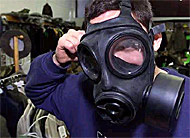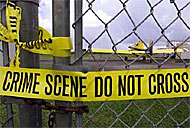|
Assessing The Terrorist Threat
How Vulnerable is the U.S. to Biological, Chemical Attacks?
 NPR's Joanne Silberner talks to doctors about the threat of bioterrorism. All Things Considered, Sept. 28, 2001. NPR's Joanne Silberner talks to doctors about the threat of bioterrorism. All Things Considered, Sept. 28, 2001.
 NPR's Jon Hamilton reports public health officials are focusing on smallpox as a threat. All Things Considered, Sept. 28, 2001. NPR's Jon Hamilton reports public health officials are focusing on smallpox as a threat. All Things Considered, Sept. 28, 2001.
 NPR's Larry Abramson reports on the budgetary costs of preparing for bioterrorism. All Things Considered, Sept. 28, 2001. NPR's Larry Abramson reports on the budgetary costs of preparing for bioterrorism. All Things Considered, Sept. 28, 2001.
 NPR's Larry Abramson reports on renewed emphasis on domestic intelligence gathering. Morning Edition, Sept. 28, 2001. NPR's Larry Abramson reports on renewed emphasis on domestic intelligence gathering. Morning Edition, Sept. 28, 2001.
 NPR's Snigdha Prakash reports on Washington, D.C.'s effort to revamp its disaster response plans. Morning Edition, Sept. 27, 2001. NPR's Snigdha Prakash reports on Washington, D.C.'s effort to revamp its disaster response plans. Morning Edition, Sept. 27, 2001.
 Researchers say the U.S. health care system needs to be better equipped to handle biological attacks. Danny Zwerdling reports for NPR and American Radio Works. Morning Edition, Sept. 27, 2001. Researchers say the U.S. health care system needs to be better equipped to handle biological attacks. Danny Zwerdling reports for NPR and American Radio Works. Morning Edition, Sept. 27, 2001.
 NPR's Richard Harris reports on the nuclear power industry's security procedures. Morning Edition, Sept. 25, 2001. NPR's Richard Harris reports on the nuclear power industry's security procedures. Morning Edition, Sept. 25, 2001.
 NPR's Jon Hamilton reports on disaster planning at Washington D.C.-area hospitals. Morning Edition, Sept. 24, 2001. NPR's Jon Hamilton reports on disaster planning at Washington D.C.-area hospitals. Morning Edition, Sept. 24, 2001.
 NPR's Debbie Elliott reports on efforts to protect Gulf of Mexico seaports. Weekend All Things Considered, Sept. 23, 2001. NPR's Debbie Elliott reports on efforts to protect Gulf of Mexico seaports. Weekend All Things Considered, Sept. 23, 2001.
 NPR's Howard Berkes reports on how Salt Lake City is prepared to deal with chemical and biological threats. All Things Considered, Oct. 1, 2001. NPR's Howard Berkes reports on how Salt Lake City is prepared to deal with chemical and biological threats. All Things Considered, Oct. 1, 2001.
 | |
A customer tries on a gas mask at an army surplus store. Many people are fearful that biological/ chemical agents could be used in future terrorist attacks.
Photo: Reuters/Stephen Hird |
October 2001 -- On Sept. 11, the tools of terror were hijacked airliners and the targets were high-profile: the Pentagon, the World Trade Center. But in the wake of those attacks, the United States finds itself unprepared for assaults with more insidious weapons and on more commonplace targets. In continuing coverage, NPR News assesses the state of the domestic terrorist threat, and of U.S. readiness to respond.
The Sept. 11 attacks have spurred officials around the country to revisit their emergency plans for protecting people and property. On Weekend All Things Considered Sept. 23, NPR's Debbie Elliott reports on how states along the Gulf of Mexico are shoring up their seaports -- and their security.
Many local hospitals have a disaster plan, a blueprint for responding to a catastrophe that leaves large numbers of people in need of medical care. The Pentagon attack showed that such plans can work, says NPR's Jon Hamilton. But the plans don't anticipate every type of attack -- and their effectiveness has been reduced by efforts to cut costs. On Morning Edition Sept. 24, Hamilton reports.
 | |
Crime scene tape hangs outside South Florida Crop Care company after investigators questioned owners of the Florida-based aerial crop dusting business. Sept. 24.
Photo: Reuters/Colin Braley |
The nuclear industry, like every other part of American society, is reevaluating security in light of the Sept. 11 attacks. In the past, nuclear power plants have tested their defenses with simulated raids by small bands of "commandoes" -- and the results haven't been reassuring. On Morning Edition Sept. 25, NPR's Richard Harris reports.
Researchers have warned for years that a terrorist attack with biological weapons could throw the United States into chaos. Government studies suggest that if terrorists spread deadly microbes, they could kill thousands of people -- perhaps even trigger an epidemic that could kill millions. While policymakers once doubted terrorists could pull off such an attack, Sept. 11 has forced them to reconsider. On Morning Edition Sept. 27, Daniel Zwerdling reports for NPR News and American Radio Works.
Also on Morning Edition Sept. 27, NPR's Snigdha Prakash reports on Washington, D.C., after Sept. 11. The Pentagon attack on one side of the Potomac River rocked the nation's capital on the other side: federal buildings were evacuated, gridlock stretched for hours. If Washington is a high-risk target, what's being done to improve its preparedness? NPR's Snigdha Prakash reports.
For some, the words domestic surveillance conjure dark moments in U.S. history: the anti-communist witch hunts of the 1950s, or FBI spying on protest movements in the 1960s. But law enforcement officials say the Sept. 11 attacks show the country needs to renew its emphasis on intelligence gathering at home. On Morning Edition Sept. 28, NPR's Larry Abramson reports.
In continuing coverage of domestic security threats, NPR News will address the vulnerability of the U.S. electric grid, pipelines and general aviation system; and the nation's preparedness (or lack thereof) for an outbreak of smallpox.
Experts disagree on the liklihood of a terrorist attack with chemical or biological weapons, but they're urging American cities to be prepared. Some cities already have preparations underway, including Salt Lake City, Utah, home of the 2002 Winter Olympic Games in February.
Salt Lake City became the focus of a $55-million effort to prepare for a chemical attack 10 years ago because of the city's proximity to the nation's largest chemical weapons stockpile, an incinerator now buring those weapons and an Army base that uses chemical and biological agents to test military defenses. And because of ongoing concerns about an attack during the Olympics, the Salt Lake City region is better prepared than most to respond to an unconventional assault by terrorists.
NPR's Howard Berkes reviews that prepardeness, including the region's responses to the coordination and communication problems cited by experts as a major barrier to readiness for chemical or biological attacks. State officials say they're ready -- to a point.
Other Resources
• The Chemical Stockpile Emergency Preparedness Program is a federal effort to prepare cities near chemical weapons stockpiles for a chemical leak or attack.
• Web site for the Utah Division of Comprehensive Emergency Management.
• Centers for Disease Control and Prevention provides a comprehensive list of biological agents/diseases and chemical agents.
• The World Health Organization says countries urgently need to prepare for bioterrorism. Read the speech delivered by the director-general of the WHO, Dr. Gro Harlem Brundtland, to health ministers on Sept. 25, 2001.
• Visit Johns Hopkins University's Center for Civilian Biodefense Studies.
• Learn more about national and international security issues from The Henry L. Stimson Center.
|